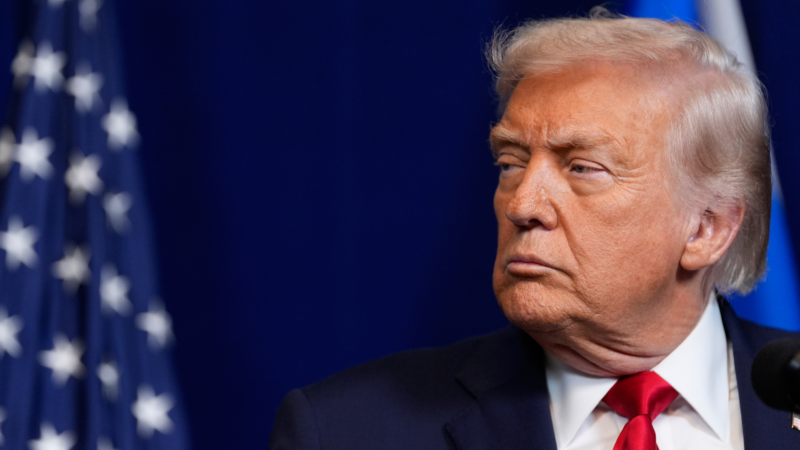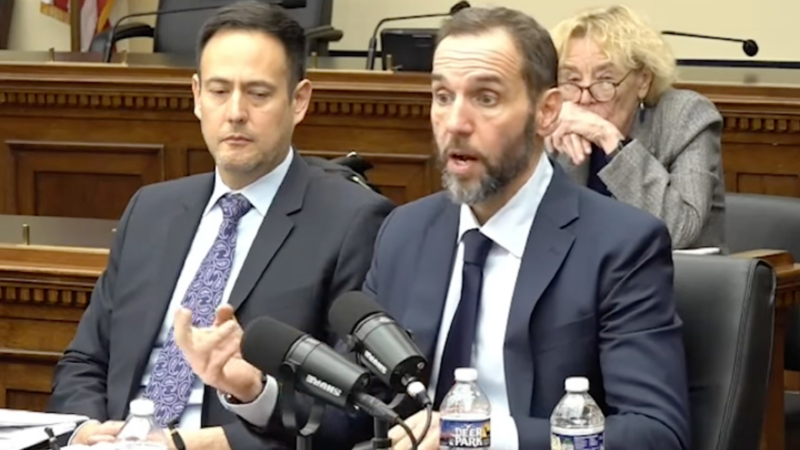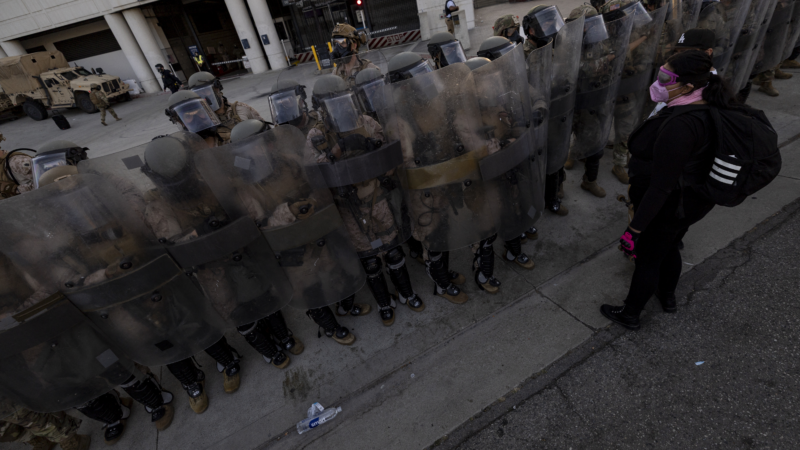What is Tren de Aragua’s footprint in the U.S.? Experts say smaller than federal officials say
The U.S. Supreme Court on Monday handed the Trump administration a victory, backing the legality of the administration’s effort to deport accused members of the Venezuelan criminal gang known as Tren de Aragua under the Alien Enemies Act. The court also required the government to give the Venezuelans “reasonable time” to contest their deportations.
Federal officials have framed the gang as a national scourge and an “invasion,” something gang experts say is likely overstated.
To justify the deportations, the federal government has relied heavily on clothing and tattoos to identify people as Tren de Aragua, for purposes of summary deportation — which eliminates the right to appear before a judge or to apply for legal status — under the Alien Enemies Act, according to court filings.
The global roster of Tren de Aragua gang members is unclear — though the administration has cited the arrest of migrants with past alleged connections as reason for the drive to remove Tren de Aragua from the United States. The Biden administration last summer classified the gang as a transnational criminal organization.
The symbols touted by federal officials as proof of gang membership, including rose and clock tattoos, are popular symbols with many Venezuelans, according to Ronna Rísquez, a Venezuelan investigative journalist who’s tracked the gang. As she’s told NPR, “Maybe there’s a Tren de Aragua member who has that tattoo, but that’s not enough to identify them as Tren de Aragua.”
Charles Katz, a professor at Arizona State University who has studied Latin American criminal gangs, says there is a huge difference between intelligence that may help police track members of a gang and actual evidence that could convict someone of gang-related crimes in a court of law.
And he says even the gang-tracking intelligence is often second- or third-hand.
“Federal agencies don’t have good gang data,” he said. “They’ve defunded most of the strategies and operations to really keep tabs on those kinds of things.”
He says it’s “silly” for federal authorities to base a Tren de Aragua membership determination on a mere symbol, such as the Nike “Jumpman” logo, which has also been reportedly cited as grounds for deportation.
Tricia McLaughlin, assistant secretary for public affairs at the Department of Homeland Security, in a statement to NPR took issue with experts and local officials who argue the gang’s presence in the U.S. is overstated.
“You should ask the families of those killed, raped and maimed by gang members if they think the threat these terrorists pose to Americans are ‘overstated,'” she said.
While gang experts believe Tren de Aragua is present in the United States, criminal cases are clustered mostly in the states that have received the most Venezuelan migrants: New York, Illinois, Florida, Texas and Colorado.
The victims of their alleged crimes are often other Venezuelan migrants, as in a federal case filed in Tennessee in February accusing eight people of running a “Transnational Commercial Sex Enterprise. At least three of the people running the organization allegedly intimidated the sex-trafficking victims by “invoking” ties to Tren de Aragua, according to federal prosecutors
In Aurora, which has been a target of immigration enforcement officials since Trump said he would start large-scale deportations with the stated aim of curbing prolific gang activity, local police say they’ve identified just over a dozen or so gang members in the city of 395,000.
And while Venezuela, and particularly Tren de Aragua, have generated the most attention from Immigration and Customs Enforcement and the president, a review of available records found that Venezuelan immigrants have made up fewer than half of those publicly identified as detained on immigration violations.
Last August, as anger about the gang was catching on during the presidential campaign, Aurora police described the gang’s presence there as “isolated.”
There are a small handful of alleged Tren de Aragua members who face criminal charges in Colorado and prosecutors are worried the defendants will be deported before they can be tried in court.
One is Nixon Perez, who was charged with felony tampering in Adams County after picking up bullet casings from a firefight in the summer of 2024 before police arrived. Perez has since been deported to an El Salvadoran prison.
“When someone is deported before a local prosecutor like me has been able to charge and prosecute a defendant, one, it means that any victim in the case does not see justice,” said Brian Mason, the county’s elected district attorney. “And two, it completely undermines our ability to prosecute what may be a larger case.”
Because Colorado doesn’t allow local law enforcement to hold anyone longer than their sentence — or after they’ve posted bond — ICE officials said they have to use other measures in finding criminals.
“ICE’s mission is public safety,” ICE Denver Field Office Director Robert Guadian said in a post on X. “Criminal aliens will not be allowed to roam free.”
DA Mason stressed that he didn’t think there had to be tension between local law enforcement and ICE.
“Historically, state prosecutors like me have had really good relationships with our federal partners and were able to work these challenges out so that there aren’t tensions, so that the federal government isn’t undermining the state government in order to seek justice in the case,” he said. “And now there is.”
Transcript:
A MARTÍNEZ, HOST:
The Trump administration says the United States has been invaded by a criminal gang known as Tren de Aragua – or TDA for short – which started in a Venezuelan prison about a decade ago. The administration portrays the gang as a de facto foreign enemy whose members may be deported without a hearing under the 1798 Alien Enemies Act. But how real is this gang invasion? Well, we brought in two reporters this morning to talk about what the evidence here is. NPR law enforcement correspondent Martin Kaste and Colorado Public Radio’s Allison Sherry, who’s been covering the situation in Aurora.
So, Allison, let’s start with you. President Trump has painted this picture of Aurora being overrun by TDA. So what’s the situation with this gang right there in Colorado?
ALLISON SHERRY, BYLINE: I mean, there is a TDA gang presence here, but we don’t have any evidence that it’s really large. For example, ICE in February targeted more than a hundred gang members in a raid at multiple apartment complexes. But then officials later told Fox News they detained only about 30 people and one gang member. You know, we’ve seen the federal government tag people as TDA gang members based on tattoos they have or nightclubs they frequent. In one case we were watching in immigration court, a judge was openly skeptical of that – that the government was equating tattoos to gang affiliations. So I think it’s safe to say there isn’t widespread agreement on the dangers TDA poses, as the government claims, even among federal immigration judges.
MARTÍNEZ: Yeah. But it’s not a new thing that the federal government goes after gang members.
SHERRY: No. But what is new is this target on their backs because of their alleged affiliation. I spoke to Colorado’s former U.S. Attorney Jason Dunn, who Trump appointed in his first term. He says, in his day, he didn’t usually look at gang affiliations but the crimes they committed.
JASON DUNN: It’s much easier to prove a felon in possession case, say, than it would be to prove, you know, narcotics trafficking or a RICO case. You know, those are not huge sentences, but they’re oftentimes a couple years in federal prison. And we found that a great way to get the worst actors off the streets, let them grow up a little bit.
SHERRY: You know, gang membership mostly, in and of itself, is not a crime. So I think most law enforcement officers prioritize other offenses to get gang members off the street.
MARTÍNEZ: So turning to you now, Martin. You’ve been looking at the question of TDA’s presence nationally. And what are you hearing from law enforcement on that?
MARTIN KASTE, BYLINE: Well, reports of TDA vary quite a bit by region. Generally speaking, it kind of tracks with where Venezuelan migrants have been settling. So more active states would be Colorado, Florida, Illinois, Texas and New York. The criminal cases against the gang members – alleged gang members – are still relatively few, especially when you compare it to cases tied to other gangs, such as MS-13 or American street gangs. But TDA is here. Its main criminal enterprise so far seems to be human smuggling, trafficking. That’s, again, something you’d see during large migrations like we’ve had in the last few years.
And some of the best information we’ve had about the gang’s methods is coming from South America, where police have been tracking them longer. For example, police in Chile have been trying to extradite some alleged gang members who they say took over some bus stations there in Chile to prey on their fellow Venezuelans as they were migrating illegally into Chile. They were extorting these people, kidnapping them and sometimes even committing rape.
MARTÍNEZ: What about, though, in the U.S.? Are we seeing the gang commit similar kinds of human trafficking crimes here?
KASTE: There have been some alleged cases. For instance, federal prosecutors in Tennessee announced in February that they were charging eight Venezuelans for allegedly running a, quote, “transnational commercial sex enterprise.” Prosecutors say the people in that group claimed to be in Tren de Aragua to intimidate their victims.
MARTÍNEZ: OK. But how can they know defendants like that are really members of a gang?
KASTE: Yeah. It’s a challenge, especially for American police and prosecutors, who are using intelligence that comes from South American police about gang members’ alleged preference for certain tattoos or clothing. But the trouble is those symbols are popular with a lot of Venezuelans, not necessarily only gang members. And it’s not always clear that this gang even requires those symbols, especially in the United States. I talked to an expert in Latin American gangs, Charles Katz at Arizona State. He says there’s a huge difference between evidence of gang membership and intel that might help police track the members of a gang but isn’t necessarily enough to convict someone. And he is not impressed with the kind of intel that the federal government is using.
CHARLES KATZ: Federal agencies don’t have good gang data. They’ve defunded most of the strategies and operations to really keep tabs on those kind of things. And most of the information that the federal government uses from law enforcement is secondary or third.
KASTE: And you can see there the problem if the federal government is using this kind of intel just to summarily deport people. There’s also another problem here in that the Trump administration, by invoking the Alien Enemies Act, is claiming that Tren de Aragua is being run by the government of Venezuela as a kind of terrorist organization invasion. But as far as the experts I’ve talked to are concerned, that’s just a claim. There’s zero evidence that the Venezuelan government is involved here.
MARTÍNEZ: All right, so back to Colorado and Allison. Are these gang members dangerous? I mean, have they been charged with any crimes?
SHERRY: There are a few alleged TDA gang members facing state charges, and ICE has been bringing some of these guys to court. But I want to talk about the case of Nixon Perez, who had a state case for felony tampering. He was accused of picking up some shell casings after a firefight. Perez recently got deported before his American criminal case was resolved. And I talked to Brian Mason, the DA on the case, on its overall precedent.
BRIAN MASON: When someone is deported before a local prosecutor like me has been able to charge and prosecute a defendant, one, it means that any victim in the case does not see justice. Two, it completely undermines our ability to prosecute what may be a larger case.
SHERRY: You know, overall, Mason says there doesn’t have to be this tension between ICE and local law enforcement, that people should face their days in court, go through due process. If they’re convicted, he says they should serve out a sentence and then be picked up by ICE. It’s been happening like this for decades. I think prosecutors and law enforcement worry now that this whole effort that the administration has said will improve public safety isn’t necessarily doing that when people don’t have to face consequences for their actions.
MARTÍNEZ: That’s Colorado Public Radio’s Allison Sherry and NPR law enforcement correspondent Martin Kaste. Thanks, you two.
SHERRY: You’re welcome.
KASTE: You’re welcome.
(SOUNDBITE OF MOGWAI’S “I’M JIM MORRISON, I’M DEAD”)
Zohran Mamdani sworn in as New York City mayor, capping historic rise
Mayor Zohran Mamdani took the oath of office in New York City after midnight Thursday. The city's first Muslim mayor, a member of the Democratic Socialists of America, has promised to focus on affordability and fairness.
Rising from the ashes, a symbol of hope at the Rose Parade
Survivors of the Eaton and Palisades Fires find healing and community working on a Rose Parade float to honor the lives and communities lost in last year's wildfires.
The history behind the NYC subway station chosen for Mamdani’s swearing-in
The city shut down the station in 1945 on New Year's Eve. Eighty years later, it's a symbolic venue choice for the incoming mayor's private swearing-in ceremony.
U.S. military strikes 5 more alleged drug boats, killing 8
The U.S. military says it struck five alleged drug-smuggling boats over two days. The attacks killed eight people, while others jumped overboard and may have survived. U.S. Southern Command did not reveal where the attacks occurred.
Capitol riot ‘does not happen’ without Trump, Jack Smith told Congress
Former special counsel Jack Smith also described President Trump as the "most culpable and most responsible person" in the criminal conspiracy to overturn the 2020 election results, according to a transcript of Smith's closed-door interview with the House Judiciary Committee.
Trump will drop push for National Guard deployments in Chicago, LA and Portland, Ore.
Courts blocked troops from deploying in Chicago and Portland, Ore., and the Los Angeles deployment effectively ended after a judge blocked it earlier this month.







